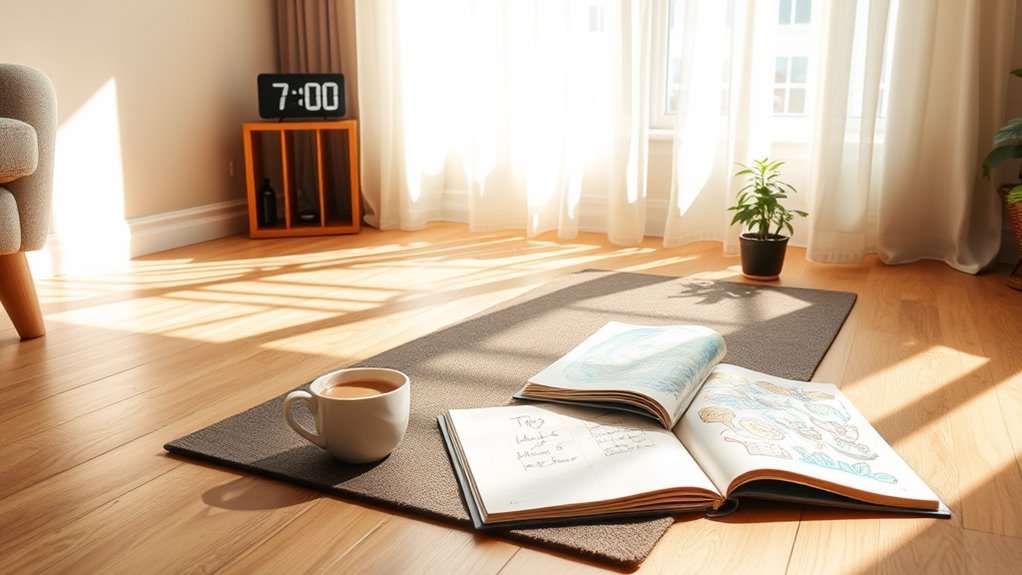The Best Sleep Tips That Will Help You Wake Up Feeling Refreshed
To wake up refreshed, you should establish a consistent sleep schedule and create a relaxing bedtime routine. Optimize your sleep environment by controlling temperature and reducing light and noise. Limit screen time and be mindful of food and drink choices before bed, avoiding caffeine and heavy meals. Incorporate physical activity and manage stress through mindfulness practices. With these tips, you’ll notice a significant improvement in your sleep quality, and there’s more to explore for better rest.
Key Takeaways
- Establish a consistent sleep schedule to regulate your internal clock and enhance overall sleep quality.
- Create a relaxing bedtime routine with calming activities like reading or gentle stretching to signal it’s time to wind down.
- Optimize your sleep environment by maintaining a cool temperature, blocking out light, and reducing noise distractions for better rest.
- Be mindful of food and drink choices, limiting caffeine and alcohol while opting for light snacks if hungry before bed.
- Incorporate regular physical activity and stress management techniques, such as mindfulness or journaling, to promote restful sleep.
Establish a Consistent Sleep Schedule
Establishing a consistent sleep schedule is essential for getting the rest you need to feel refreshed. When you go to bed and wake up at the same time every day, you’re training your body to regulate its internal clock.
This predictability leads to better sleep quality, allowing you to cycle through the necessary stages of sleep more effectively. Avoiding drastic changes on weekends can help maintain this rhythm.
You might find it beneficial to limit caffeine and screen time before bed, as these can disrupt your schedule and hinder your ability to fall asleep. Additionally, creating a comfortable sleep environment can significantly enhance your ability to drift off and stay asleep throughout the night.
Create a Relaxing Bedtime Routine
To feel truly refreshed, you need a calming bedtime routine that helps you wind down.
Incorporating consistent sleep habits can make a big difference in how well you sleep.
Let’s explore some relaxing activities that can set the stage for a restful night. Additionally, establishing a relaxing bedtime routine can significantly enhance your overall well-being.
Wind Down Activities
As you prepare for bed, incorporating calming wind-down activities can greatly enhance your sleep quality. Start by dimming the lights and engaging in activities that signal your body it’s time to relax. Consider this table of effective wind-down activities:
| Activity | Duration | Benefits |
|---|---|---|
| Reading a book | 20 minutes | Reduces stress |
| Gentle stretching | 10 minutes | Relaxes muscles |
| Listening to music | 15 minutes | Calms the mind |
Choose activities that resonate with you, allowing your mind and body to shift smoothly into rest. By establishing this routine, you’ll not only prepare for sleep but also cultivate a more peaceful environment, setting the stage for rejuvenation. Additionally, implementing simple nighttime rituals can further support your transition into sleep.
Consistent Sleep Schedule
Creating a consistent sleep schedule can greatly improve your overall sleep quality, especially when paired with a relaxing bedtime routine. Start by setting a fixed time to go to bed and wake up each day, even on weekends. This helps regulate your body’s internal clock, making it easier to fall asleep and wake up refreshed.
To enhance your routine, incorporate calming activities like reading, gentle stretching, or meditation before bed. Avoid screens at least an hour prior, as blue light can disrupt melatonin production. Embrace a simple evening routine to help signal your body that it’s time to wind down.
Keep your sleeping environment cool and dark to promote deeper sleep. By mastering this routine, you’ll not only enhance your sleep quality but also boost your productivity and mood throughout the day.
Optimize Your Sleep Environment
To feel truly refreshed, it’s essential to optimize your sleep environment.
Start by controlling the room temperature, blocking out light, and minimizing noise distractions.
These small adjustments can make a big difference in your sleep quality. Additionally, creating a calming atmosphere with relaxation techniques can further enhance your ability to fall and stay asleep.
Control Room Temperature
When you control the room temperature, you can greatly improve your sleep quality. Aim for a cooler environment, ideally between 60 to 67 degrees Fahrenheit. This temperature range promotes a natural drop in your body’s core temperature, signaling it’s time to rest.
If you find yourself too warm, consider adjusting your bedding or using a fan for circulation. A cooler room not only aids in falling asleep faster but also enhances the quality of your sleep cycles.
Don’t forget to monitor humidity levels, as excessive moisture can disrupt comfort. By mastering your sleep environment’s temperature, you set the stage for deeper, more restorative sleep, ensuring you wake up refreshed and ready to tackle the day.
Block Out Light
A dark sleeping environment greatly boosts your ability to fall asleep and stay asleep. To achieve this, invest in blackout curtains or shades. These will effectively block out external light sources, ensuring your bedroom remains pitch black.
If complete darkness isn’t possible, consider using a sleep mask; it’s an easy way to shield your eyes from intrusive light.
Additionally, eliminate any bright LED lights from electronics, as even small glows can disrupt your sleep cycle. Cover or unplug devices that emit light, creating a serene sanctuary.
Remember, your brain associates darkness with rest, so prioritizing this aspect of your environment will set the stage for deeper, more restorative sleep.
Take these steps seriously, and you’ll awaken feeling truly refreshed.
Minimize Noise Distractions
Creating a dark sleeping environment is only part of the equation for a restful night’s sleep; minimizing noise distractions is equally important.
To optimize your sleep environment, consider these strategies:
-
Use White Noise Machines****: These can mask disruptive sounds and create a consistent auditory backdrop.
-
Soundproof Your Room: Invest in heavy curtains or acoustic panels to dampen external noise.
-
Turn Off Electronics: Silence notifications and unplug devices that create unnecessary sounds.
-
Establish a Quiet Time: Designate an hour before bed for peace, encouraging both you and others to keep noise to a minimum.
Limit Exposure to Screens Before Bed
As you wind down for the night, limiting exposure to screens can greatly enhance your sleep quality. The blue light emitted by phones, tablets, and computers disrupts your natural circadian rhythm, making it harder to fall asleep.
Aim to unplug at least an hour before bed. Instead of scrolling through social media or binge-watching shows, consider reading a book or practicing relaxation techniques.
Creating a tech-free zone in your bedroom can reinforce this habit. You’ll find that your mind starts to unwind, allowing you to drift into a deeper sleep.
Prioritizing this simple change can lead to more restorative slumber, so embrace the power of a screen-free evening and watch your sleep transform.
Be Mindful of Food and Drink Choices
While it might be tempting to indulge in heavy meals or caffeinated beverages before bed, being mindful of your food and drink choices can greatly impact your sleep quality.
Here are four strategies to take into account:
-
Limit Caffeine – Avoid caffeine in the afternoon and evening; it can disrupt your sleep cycle.
-
Choose Light Snacks**** – If you’re hungry, opt for light snacks like yogurt or a banana to avoid digestive issues.
-
Hydrate Wisely – Drink water throughout the day but limit fluids right before bed to reduce nighttime awakenings.
-
Avoid Alcohol – While it may initially make you sleepy, alcohol can lead to fragmented sleep and reduce overall restfulness.
Incorporate Physical Activity Into Your Day
Incorporating physical activity into your day can greatly enhance your sleep quality and overall well-being. Aim for at least 30 minutes of moderate exercise most days; it doesn’t have to be intense.
Whether it’s brisk walking, cycling, or yoga, find an activity you enjoy to make it sustainable. Morning or early afternoon workouts can help regulate your body’s internal clock, promoting deeper sleep at night.
Additionally, try incorporating short bursts of activity throughout your day, like taking the stairs or doing quick stretches. This not only boosts your energy but also reduces feelings of fatigue later on.
Ultimately, consistent physical activity not only prepares your body for restful sleep but also elevates your mood and cognitive function, ensuring you wake up refreshed.
Manage Stress and Anxiety Levels
Managing stress and anxiety levels is essential for achieving restful sleep and waking up rejuvenated. When your mind races, quality sleep eludes you.
Here are four strategies to help you regain control:
-
Practice mindfulness: Incorporate meditation or deep-breathing exercises into your routine to calm your mind before bed.
-
Establish a wind-down ritual: Create a consistent pre-sleep routine that signals your body it’s time to relax.
-
Limit screen time: Reduce exposure to screens at least an hour before sleep, as blue light can heighten anxiety.
-
Journal your thoughts: Write down worries or to-do lists before bed to clear your mind and release tension.
Implementing these techniques can considerably ease stress, paving the way for rejuvenating sleep.
Consider Sleep Aids Wisely
When you’re struggling to fall asleep, it might be tempting to reach for sleep aids as a quick fix. However, it’s essential to evaluate them wisely.
While some over-the-counter options can help, they may mask underlying issues rather than resolve them. Instead of relying solely on these aids, focus on building a consistent sleep routine and addressing the root causes of your insomnia.
If you opt for sleep aids, consult with a healthcare professional to find the most suitable option for your needs. Remember, the goal is to enhance your sleep quality without becoming dependent.
Frequently Asked Questions
How Much Sleep Do Adults Generally Need Each Night?
Adults generally need between seven to nine hours of sleep each night. Prioritizing this amount helps you maintain ideal health, enhances cognitive function, and boosts your overall well-being. Don’t underestimate the power of quality rest!
Can Napping During the Day Affect Nighttime Sleep Quality?
You might think a little afternoon snooze is harmless, but it can disrupt your nighttime slumber. If you’re keen on mastering your sleep, consider limiting those daytime naps to guarantee deeper, more restorative nights.
What Are the Signs of a Sleep Disorder?
You might notice signs of a sleep disorder if you experience persistent insomnia, excessive daytime sleepiness, snoring, or frequent awakenings. It’s essential to consult a healthcare professional if these symptoms disrupt your daily life.
How Do Different Sleep Positions Influence Sleep Quality?
Studies show 70% of people sleep better on their side. Your sleep position affects spinal alignment and airflow, influencing overall sleep quality. Experiment with different positions to find what works best for your body and comfort.
When Should I Seek Professional Help for Sleep Issues?
You should seek professional help for sleep issues when insomnia persists for weeks, you experience excessive daytime fatigue, or your sleep disruptions impact daily life. Don’t hesitate to consult a healthcare provider for tailored advice.





